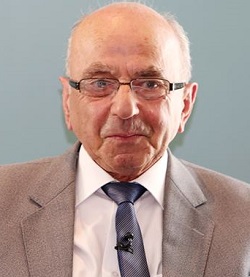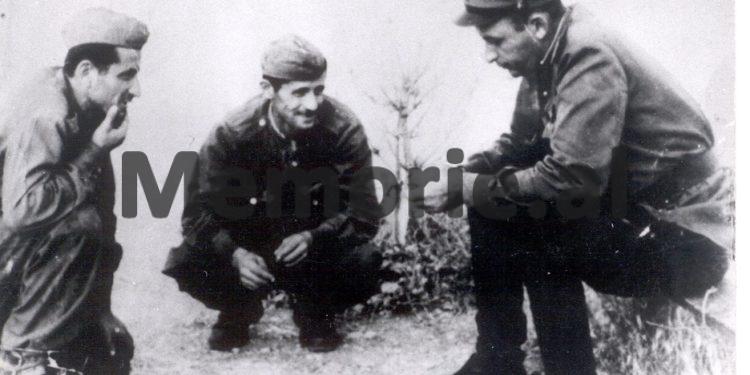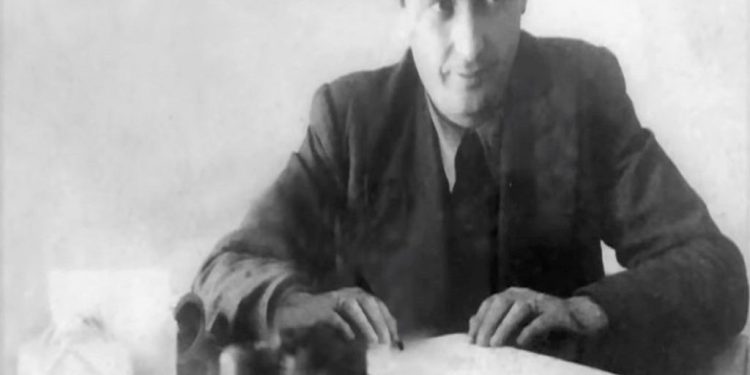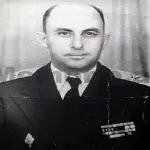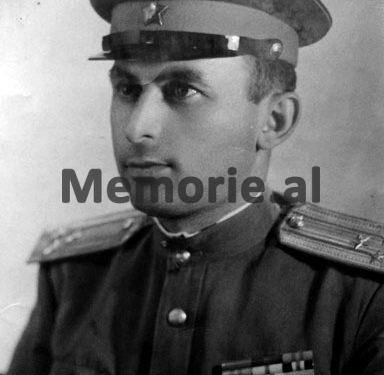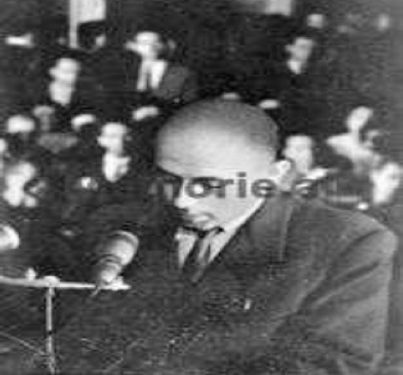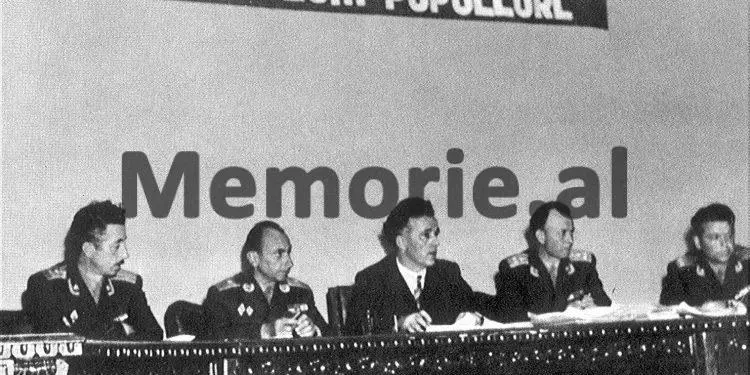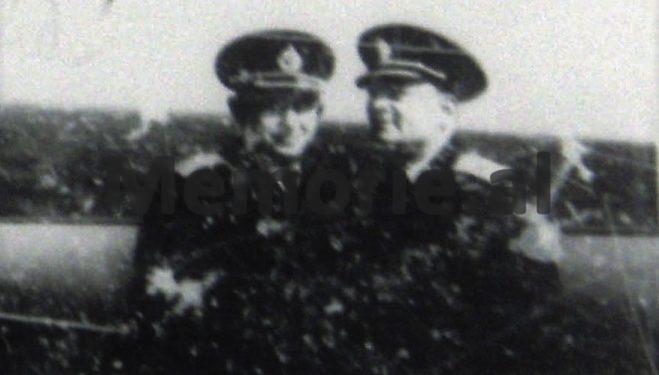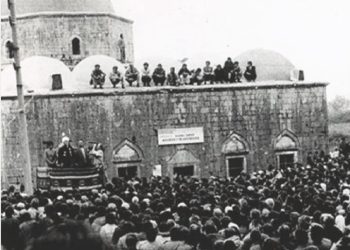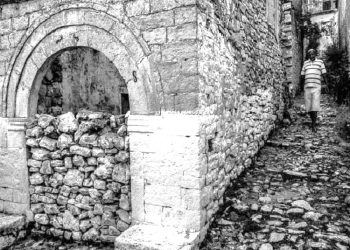From Gëzim Peshpia
The fifth part
Memorie.al / From time to time I had published some writing about disconnected events with the permanent hesitation towards the well-known pens that brought this tragic time through their books. Even the passive description does not work, that’s why I had to become a commentator of this period in order to present not only the tragic, but in general the life. With these glimpses of stories I do not pretend to bring vivid images, but a very small contribution to the memorial in honor of their memory.
How did I know the “putschists” of Teme Sejko…?!
Over time, I got to know characters that were known not only in Albania. Here was the largest part of the “Teme Sejko Group”.
I found Jonuz Purizon, ninety years old, whom I had seen filmed in court. I remembered the image when he gathered his hand around his big ear like a trumpet and addressed the judge from time to time because he couldn’t hear well with the word: “Lepe!”
They held him by the arms when he moved. It was full of difficulties with the big tongue out. From this group, in my free life, I had known Skënder Bari, who had been a bartender at the bar “Hekurudha”, on the beach of Durrës.
They sentenced him to death and after thirty-seven days, they spared him his life. Skenderi was the strongest worker and perhaps the only one who won the flag every month and two and a half days a month, which were deducted from his sentence. I told him that I had rented his house one summer.
I saw there the famous Nasho Gërxho, who, whatever he was doing, imagined meetings between shepherds and saboteurs, new documents about Teme Sejko’s connections, and unimaginable things that you would envy even Karl May, who wrote books with trips to places you’ve never been and meetings with people you’ve never even dreamed of!
After confronting them in the interrogator, the shepherd comforted them: “No, we will all be there together and you don’t have to be upset.”
Then when they came to the camp, they were served a welcome lunch and, surprisingly, they didn’t hold a grudge and didn’t take revenge like many Albanians. In general, the Vlachs, or as they used to call them “chobes”, were gentle, hardworking and humble people. They were submissive and I didn’t know anyone who kept the kapadai. Almost all of them had accusations of “agency and espionage”.
A very impressive person from the “Teme Sejko Group” was Sami Murati. Poor Sam! With a sad look, with an expression of his physiognomy that read innocence, he was waiting for an answer from no one…!
It broke your soul! He had lost his mind since he was sentenced and in all his actions, he had to be guided by someone holding his hand like a child. The cruel State Security had disfigured that delicate and wise man. Keeping him in prison was as absurd as it was inhumane!
At the same time, the flagrant nature of his case was discrediting to Sigurimi. Kept in prison “for re-education”, a man without a conscience. Even the command, with officers and non-commissioned officers, avoided commenting on it. How cruel was his confinement! My friend, Jani Gjino, had worked with him at the Publishing Company.
He described him as a perfect man: polite, cultured, typical intellectual, hardworking and quite serious. Sami was lost in the dark world of Alzheimer’s!
As a result of inhumane torture accompanied by drugs that degraded the central nervous system, he manifested the symptoms of “Dementia totalis” or “Alzheimer’s disease”. Yet nobility stood out in its complexity.
A cham served him with piety and patience, as if he had a brother. After this man was released, Sami fell into bad hands. Despite his lack of speech, he expressed his indignation with nervous gestures and teary eyes. One day, suddenly, he scratched the young tutor’s face.
I ate for two years in a row at a table with him. Only once did I hear him say, stretching his palm forward, two words: – “It’s useless”!
It was a revolt; it was the answer he gave to all those shaved heads wandering the evening walk, which had a common denominator: the question “WHY IS I HERE”?!
It was the two-word message that started to the persecutors who had been closing their ears for years to not hear their screams, the screams of others…!
One day they disappeared from the camp. They said they sent him to the hospital. They said that the family that you had come to visit, they gave the news that he had died during the operation. What did he suffer from? He did not know how to complain because he was unable to speak. What operated? Nobody knew anything…!
Skender Bariu told me that he had been the battalion commissar. With his coolness and gentleness, he had saved the life of a partisan who wanted to shoot him, accusing him of stealing a towel.
Most of the “Teme Sejko Group”, as they were called, had been in the “Chameria” detachment. In 1949, Rexho Hiso, from the State Security, together with a Greek officer, gathered the former Cham partisans and told them to come to Greece to fight. Skenderi stood up and openly refused, saying that another Tivar can be prepared.
With this, Skendera was sealed as an organizer. On this occasion, one hundred and sixty-four Chams were interned, and joining two hundred other Chams, they made them open the Gramsh-Lozhan road, with forced labor, for eight months in a row.
The arrest of the “Teme Sejko Group” of three hundred and seventy-four people was made with great fanfare. They arrested them within an hour. Most of them, under the violence of the most terrible tortures, accepted “Alla-Dreyfys” participation in the conspiracy and to think that we were in 1960 and not in 1906!
The parallelism surprisingly coincided with the ethnicities that were persecuted; the Jews of Alfred Dreyfys and the Chams of Teme Sejko. The first was Teme Sejko himself, who agreed before Kadri Hazbiu and Nevzat Haznedar, to tell tales with the king, with the fleet, with Panajot Plak, with living beings and ghosts, actions worthy of a police thriller “because the interests of the Party demanded it “…! The trial would be a show, consumption for propaganda, against the imperialist-revisionist agencies!
Poor Temja remembered late and when he lost hope, after the decision Kadri said to Hazbiu: – “Dog, you betrayed me”! – Temja had been the battalion commissar in the First Brigade and they say that Mehmet Shehu wanted to meet him after the decision, but Kadri Hazbiu deprived him of this pleasure, because the night before, he executed him with a flamethrower!
They also say that Mihallaq Ziçishti strangled him in the dungeon with his hands. Along with Temen, Tahir Demi, Avdul Resuli, Hajri Mane, Ali Arapi, Shaban Refati, Taho Sejko, Ilia Gjyzeli (brother-in-law of the ‘People’s Hero’) and others were shot. Nevruz Bejleri from Libohova, who had brought the head of Izet Osmani from Greece, was asked to testify, as if Izet was alive.
Nevruzi refused, so they shot him without trial. From the relative of Hero Ali Demi, there was also the brave journalist, Vehip Demi, who, full of courage, had criticized Nexhmije Hoxha and Liri Belishova, at the Tirana Conference in 1956, but later he disappeared without a trace and was arrested by Sigurimi. Recently, they killed Kasem Demin, a wise man, probably the next victim.
Teme Sejko’s family had a tragic end. Artan Qirko, was convicted in a group with Sokol Sejko, Teme’s son.
During the process in the investigator, Artani with his testimony aggravated the position of the accused of Sokol, in exchange for the reduction of the sentence, which Artani himself would receive. Then, Sokol was shot. Artan told me that he was an intelligent and very kind boy.
Later they arrested Teme’s second son, Mondi, while the mother killed herself. There I also found Rexho Plaku, with a clear mind, former fighter of the Vlora War in 1920, former partisan and a man with great influence in Çameri. He managed to survive and go to his family even though he passed ninety years.
Ali Goxhaj was a tragic-comic figure. He also belonged to “the agency of Teme Sejko’s group”. The tortures had destroyed him and at first glance, he gave the impression of a mentally ill man.
The torturers had stamped a different character on him. For Ali, suffering from the disease of vigilance and denunciation was formed in type. As soon as he heard any suspicious words about Enver, or any other leader (there were often people who did it on purpose), he ran to the policeman who stood guard at the door, and reported him, but he was ignored, as they called him sick.
One day I was with my friend, Jamarbër Markon, in the Reeducation Office, joking with Dalip Zhaboli, who was the chairman of the Reeducation Council. From the open door, we see Sadik, the policeman, who was an internal guard, saying to Ali: – “Go there to Dalipi and inform him about everything”.
Sadik, who was hard of hearing, was a guy who liked jokes. Dalip, who was ready for a fire, closed the door and, saluting with his fist, said:
– “Long lives Enver Hoxha”! – Aliu honored and Dalipi called after him: – “Long live Mehmet Shehu”!- Aliu too. Dalip:
– “Long lives Petro Marko”! – Ali repeated loudly, while we went out shouting. Many others who disliked the prison humor looked down upon him, but poor Ali, like many of his comrades, was a victim of the same terrible criminal machine. Memorie.al
The next issue follows




